Contents
Page List
Guide
TALES OF WHITETAILS
TALES OF WHITETAILS
Archibald Rutledges Great Deer-Hunting Stories
Edited by JIM CASADA
UNIVERSITY OF SOUTH CAROLINA PRESS
For Mom and Dad, who gently nurtured my interest in the outdoors; quietly endured anxious moments as I enjoyed natures wonders in the solitude of the Smokies; and still share my love of field, forest, and stream.
Copyright 1992 Jim Casada
Hardback edition published by the University of South Carolina Press, 1992
Ebook edition published in Columbia, South Carolina,
by the University of South Carolina Press, 2020
www.uscpress.com
29 28 27 26 25 24 23 22 21 20
10 9 8 7 6 5 4 3 2 1
The Library of Congress has cataloged the hardback edition as follows:
Rutledge, Archibald Hamilton, 18831973.
Tales of whitetails : Archibald Rutledges great deer-hunting stories / edited by Jim Casada.
p.cm.
Includes bibliographical references.
ISBN 0-87249-860-3 (alk. paper)
1. White-tailed deer hunting.2. Deer hunting.3. Hunting stories, American.4. Rutledge, Archibald Hamilton, 18831973.5. HuntersSouth CarolinaBiography.I. Casada, James A.II. Title.
SK301.R881992 | 92-20100 |
799.2'77357dc20 |
ISBN 978-0-87249-860-0 (hardback)
ISBN 978-1-64336-133-8 (ebook)
Front cover photograph by Ted Borg
CONTENTS
ACKNOWLEDGMENTS
Mine is a special debt of gratitude to Judge Irvine Rutledge, Flintlocks sole surviving son. He has taken a keen interest in this project from the outset and has supported it enthusiastically. Rob Wegner, Americas leading authority on the history and literature of whitetail hunting, has contributed to my efforts in a variety of ways. Nick Lyons, as is ever his wont, has offered quiet wisdom and words of encouragement. Lou Razek of Highwood Books has provided assistance and insight from his unrivaled collection of outdoor periodicals. The fine folks in the Reference Department at Winthrop Colleges Dacus Library have helped procure what must have seemed to them an endless stream of research materials on interlibrary loan. Warren Slesinger, Peggy Hill, and others at the University of South Carolina Press have prodded me when progress was slow; provided support when it was needed. Finally, as always, Ann and Natasha have caredand shared.
A NOTE ON SELECTION
As the bibliography which concludes this work indicates, Archibald Rutledge wrote prolifically on deer and deer hunting. While he has been accused, with some degree of justice, of killing the same buck repeatedly in print, even so he produced scores of fine, original deer stories. These were by no means equal in literary merit, yet the vast majority of his deer stories are both readable and entertainingeloquent testimony to his deep devotion to the animal. There is also an enduring quality to his work, one which guarantees that so long as man takes to the hunting field, the best of Rutledges writings will remain timely.
The selections which follow were chosen primarily with an eye on two criteriaas the most readable and most representative of his many tales of whitetails. Some are obscure; others well known. For anyone who wants to travel further with Rutledge, the bibliography will serve as a guide. Meanwhile, what follows is my personal choice of thirty-five of his finest writings on deer.
TALES OF WHITETAILS

Introduction

FLINTLOCK AFIELD:
A Life Devoted to Deer
Fascination with deer runs a bright thread through the fabric of Archibald Rutledges life. Fortunately for posterity, one outlet of his passion for whitetails was in print, and arguably no American sporting writer has been more successful in capturing the myriad, and often elusive, meanings of the hunt. Deer figured in Rutledges dreams, as they also, in one fashion or another, occupied many of his waking hours. Some of the happiest times of his life were spent hunting whitetails, and he also devoted countless hours as a nocturnal naturalist observing them from a specially built platform in a live-oak tree. Mementoes of hunts past surrounded him at Hampton Plantation, the family home in the Santee delta. Even during the better than three decades Rutledge spent at Pennsylvanias Mercersburg Academy as a teacher, he lived from Christmas to Christmas in anticipation of holiday deer hunts back home in the South Carolina Low Country.
Rutledge hunted deer for almost eighty years, and he wrote about them for more than sixty years. Throughout his adult life he meticuously maintained a hunters diary, in which he dutifully recorded the details not only of every hunt but also of each encounter he had with deer. Some indication of the extent of his contact with whitetails is given by the fact that in 1952, better than two decades before his death, his records showed that he had observed, in their native haunts, under almost all conceivable circumstances, more than 8,000 wild deer. Sadly, his diary, along with the manuscript of an unfinished autobiography, was lost late in his life when fire swept the familys Summer House near McClellanville. Rutledge managed to reconstruct and rewrite much of the autobiography, only to have it mysteriously disappear from his bedside at the time of his death. These losses notwithstanding, Rutledge wrote so prolifically on deer and had such a gift for recapturing the ethos of individual hunts that the corpus of his writings on whitetails is unmatched in the annals of American sporting literature.
His style was far removed from the transitory and frequently stale how to and where to approaches commonly encountered today. Rutledges writings went far deeper than mere discussion of the essentials for being a successful hunter. He had an unrivaled knack for rendering the thrill of the chase, and his ability to set a scene was such that it placed the reader squarely amid the deep swamps, ridges of mixed pines and hardwoods, and dense thickets of palmetto and greenbrier that were the hallmarks of his hunting world. At times it seemed almost as if he enjoyed a symbiotic relationship with deer; certainly they sustained him from a literary standpoint and helped give meaning to his entire existence. He once wrote that startlingly close, indeed, is the bond between human life and animal life of high intelligence, and he considered deerthat noble, elusive, crafty, wonderful denizen of the wildsto be the wisest of game animals.
Rutledge followed, in the pursuit of sport, a life-style which to him represented important values such as honesty, manliness, and fellowship. His firm belief was that there was much more to hunting than hunting, and he considered renewed health, a more wholesome outlook on life, [and] a reverence for the miracle of creation among the benefits of the quest. He praised whitetails in poetry, found in them inspiration for a sophisticated philosophy, and perhaps most important of all, immortalized the world of the hunter and the hunted in prose.
Stories on deer are liberally sprinkled throughout his books, and his whitetail writings appeared in the major outdoor magazines of his day on a regular basis. For some reason, however, he never wrote a book devoted exclusively to the animal. Indeed, with the single exception of

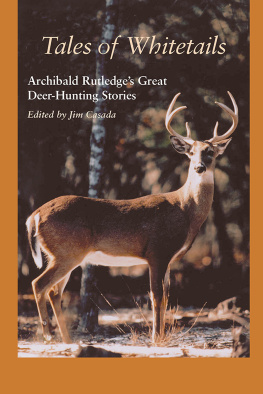

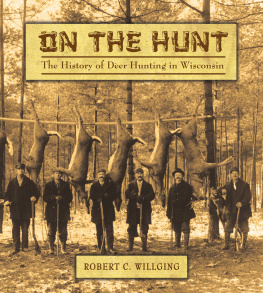
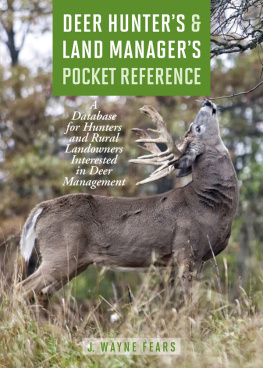
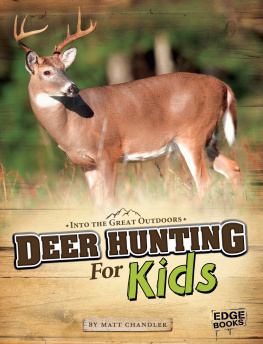
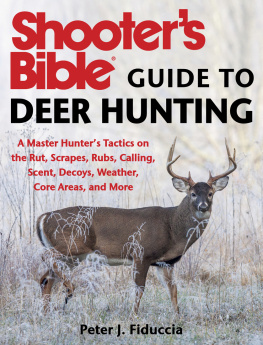
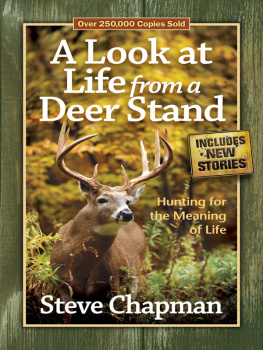
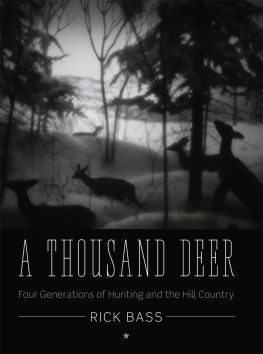
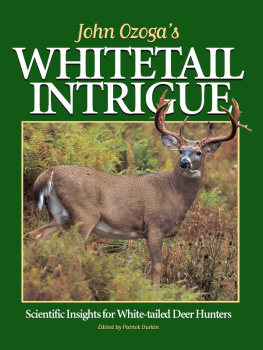
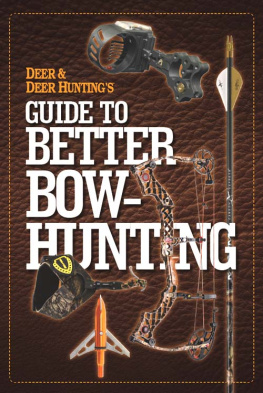

 Introduction
Introduction